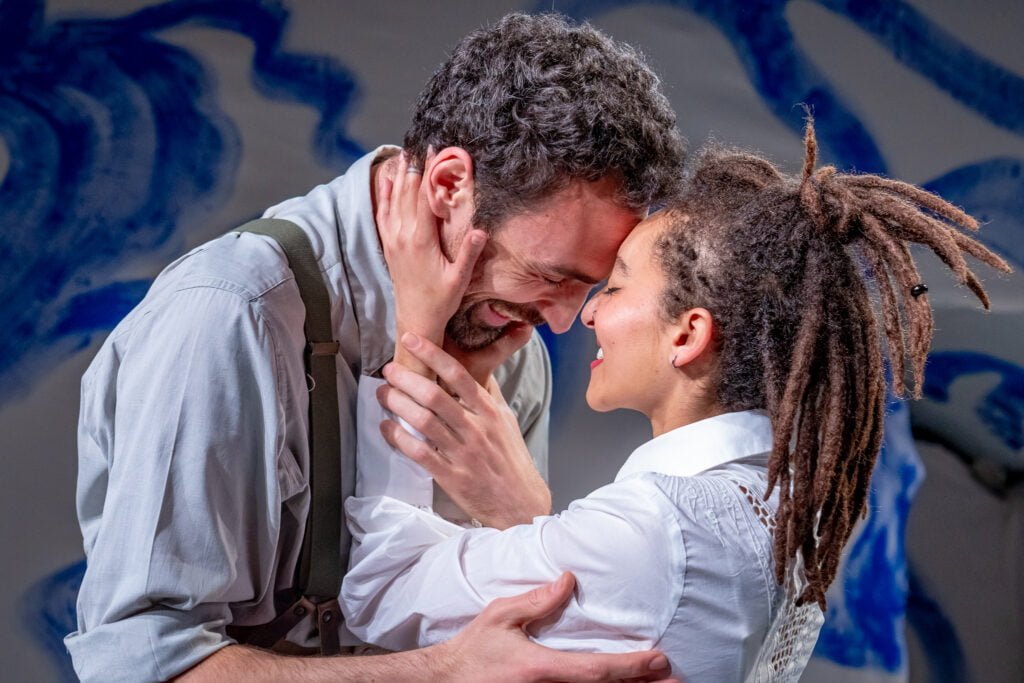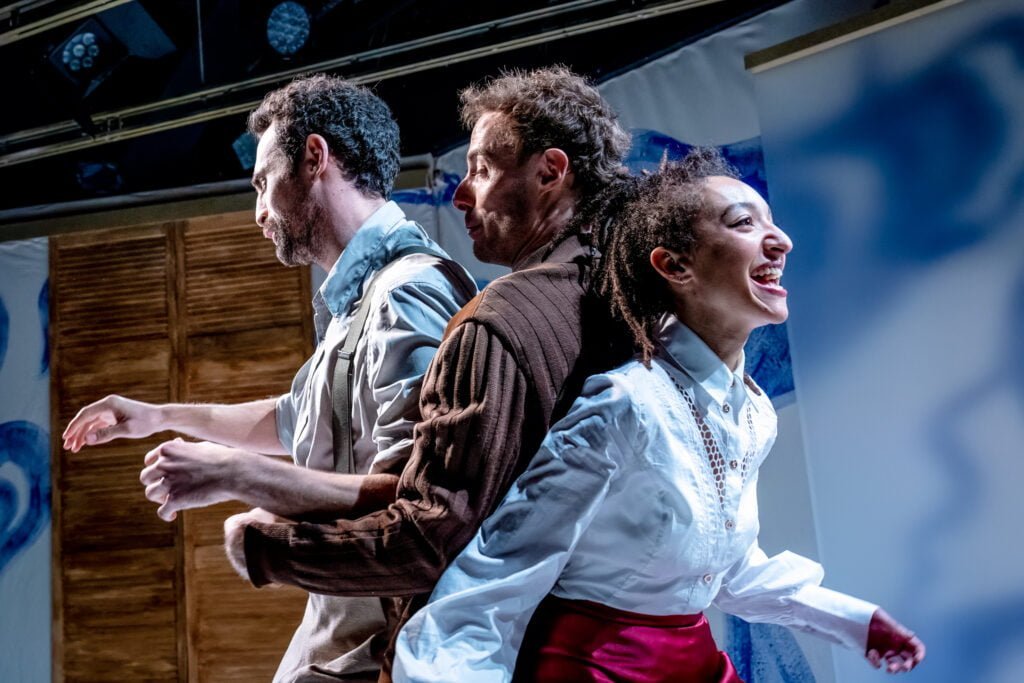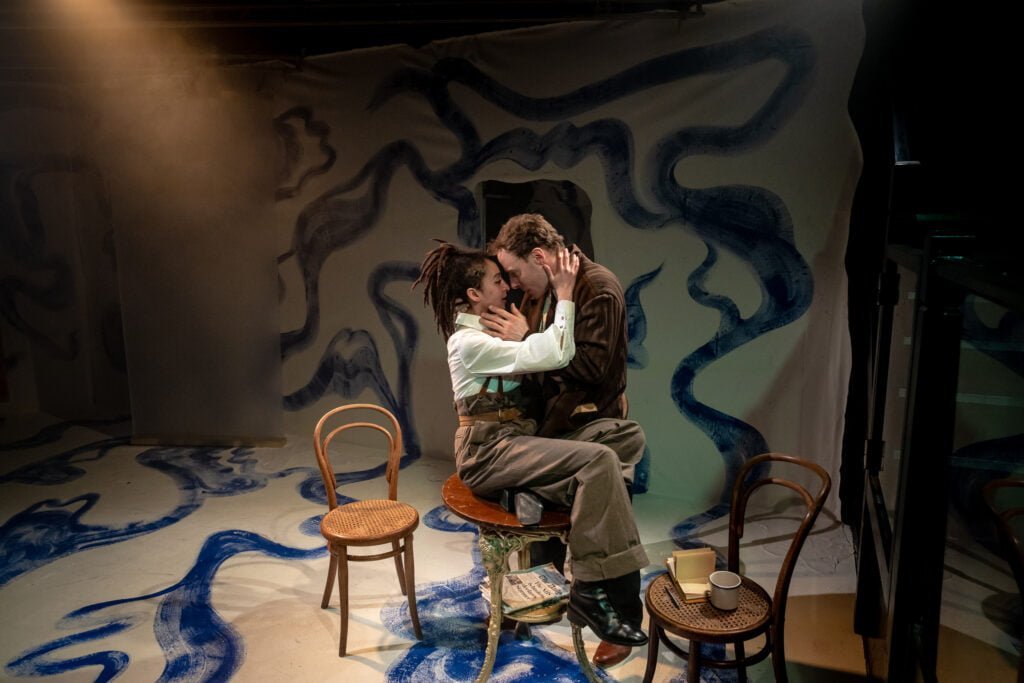Le Ménage à Trois
“I want to love one Woman”
Jules.
“I want to love Women”
Jim.
“I only seek Justice”
Kath.

It’s an understatement to say that the Jermyn Street is a Studio Theatre. With its 70 seats how can it hope to project François Truffaut’s New Wave classic Jules et Jim with its real locations, fluent camera, music, costumes, epic chariot race, and cataclysmic ending? No, there is no chariot race in the movie, but there is a sprint across a railway bridge, which Jeanne Moreau, inexpertly disguised as a boy, wins by cheating.
This production (with Timberlake Wertenbaker’s text and Stella Powell-Jones’s direction) intensifies Henri-Pierre Roché’s transgressive love story by digging down into the characters and exploiting the limited space of the theatre itself. The set is three chairs and a table, a doorway labelled to ‘Toilettes’, which really means what it says, a pair of screens, and wild swirls of paint. So basically the actors are the set. Jim (Alex Mugnaioni) and Jules (Samuel Collings) meet and bond in Paris, 1907. We see the easy self-assurance of two young men, with all their shallow aphorisms and condescension towards life in general and women in particular. We see that self-assurance decay as Reality catches up with them over three decades. Their friendship remains unshaken even when Kath (Patricia Allison) enters their lives. She teaches them that she is a real person. Certainly not, as they fondly believe, the avatar of a beautiful Greek goddess who promises mystery and erotic fulfilment if only they can overcome jealousy and schedule access to her. But she also reminds them that deities can have their own agenda. And may demand blood.
Jules and Kath marry in 1914 and are instantly separated from Jim by the Great War. When the men meet again we don’t learn much about their war experience. Nor anything at all about Kath’s, except that she bore and reared two children while the men got on with ravaging the face of Europe. However, we never hear more of the children or of their impact on Kath’s life. They have no voice. Although their potential siblings do play an important part in everyone’s life.

Jules is now an academic specialising in Eastern literature and Jim is a possibly unfulfilled dilettante who lives with his mother. Nevertheless Kath, who had already tried to hint her desires before the war, makes it clear she wants Jim as a partner. Post-war she is determined, articulate, and won’t be patronised. Have the men lost their gender-based authority their pointless conflict?
“Why can’t we all three live in a house full of children and laughter?” suggests Kath.
Jules, helped by his professional interest in Eastern stoicism and his practical experience of Kath, accepts the situation. Jim doesn’t do quite so well...
“Friendship forgives weakness. Love doesn’t. – Love lives through us like a virus. And like a virus it kills us… “
So things, as you probably know, end badly.
Jules and Jim is played without a break. Though perhaps it could use one. The pace of the Paris years is quite relaxed and uneventful. (Except for all that vomiting in the Adriatic. Does it have to go on at length?) But once we move east the pace accelerates and there is much more telling than showing, which tends to weaken the drama. Although it is powerful when Kath turns the tables on the men in her life – or at least two of them – and defies the intellectual equivalent of the male gaze. She is more than their equal as a debater and sexual strategist. Her final scenes with Jim have a real dramatic tension that has taken too long to arrive.
Of course it’s unfair to compare this defiantly theatrical piece with Truffaut’s original. But the unbearable poignancy of that film’s final sequence casts a pale shadow over the climax we see here.
So perhaps treat yourself to that iconic original after enjoying this beautifully staged and performed production. In a venue a stone’s throw from the statue celebrating Anteros, champion of Requited Love.

Production Notes
Jules and Jim
Written. by Henri-Pierre Roché
Adapted by Timberlake Wertenbaker
Directed by Stella Powell-Jones
Cast
Starring:
Alex Mugnaioni
Patricia Allison
Samuel Collings
Creatives
Director: Stella Powell-Jones
Designer: Isabella Van Braeckel
Movement Director: Elliot Pritchard
Lighting Designer: Chris McDonnell
Composer and Sound Designer: Holly Khan
Originated by and originally commissioned by Eduardo Barreto
Information
Running Time: One hour and 30 minutes without an interval
Booking to 27th May 2023
Theatre:
Tube: Piccadilly Circus
Reviewed by Brian Clover
at Jermyn Street Theatre
on 26th April 2023
